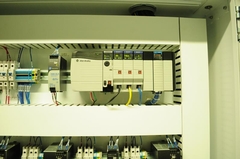
A Programmable Logic Controller (PLC) is an electronic device used to monitor or control
production processes. It is a hardened industrial grade computer that a user can program to
perform a series or sequence of events, control system operations based on conditional
formatting of system input that then are used to translate into the status of system outputs. These
events are triggered by inputs received at the programmable logic controller. Advanced math and
comparison operations are all a part of the operational effectiveness of the logic and conditional
formatting that is then used to control the status and or level of the resultant system outputs.
A Programmable Logic Controller will continually loop through its user defined program,
waiting for inputs and giving output status at the specific programmed times. They are designed
to function in industrial environments and can withstand extreme temperatures, humidity,
vibration, and electrical noise.
Generally, PLCs are tasked with monitoring or controlling a group of sensors and actuators.
PLCs are basically like industrial computers because they have microprocessors but are more
robust than the average home computer, operate at a much more defined range of purpose and
because of the dedicated nature of the operation function at a much higher level relative to speed
and or reliability. PLCs use a different language than home PCs as well and require vendor
specific programming software to generate the internal code of the controller.
PLCs eliminate the need to rewire or add additional hardware to make things work, these
decisions on how to utilize the information wired and available at the controller are configured
through the software and in many cases embedded instruction within the software allow for ease
of deployment. PLC’s increase the functionality of controls and don’t take up a large amount of
physical space and have mounting options that allow for them to be easily and quickly mounted
to an industrial control deployment. They are also flexible and easy to modify as application
needs change. Utilizing programmable logic controllers is a cost-effective method of controlling
complex systems. PLCs are best used in applications where machinery can work on its own
without human labor having to constantly monitor and a real benefit is the consistency of the
monitoring of the code as well as the timely activation of the resultant outputs. Things like
batching and or recipe-based systems are easily applied to allow for consistent production and
batch to batch identical products.
What kind of industries utilize PLCs? Some of the many examples of practical PLC applications
are listed below:
Automotive: Assembly line and individual component manufacturing
Food and Dairy: Batching Systems for Production; Product Raw Steam refinement; Cleaning
systems
Product Handling: Conveyors, Packaging lines with labeling and Product Tracing Identifiers
Wastewater: Controlling system operations monitoring system levels
Wearhouse Management: Automated Storage and Retrieval Systems
In addition to the items listed above there are endless manufacturing operations that utilize PLCs
to control their systems.
